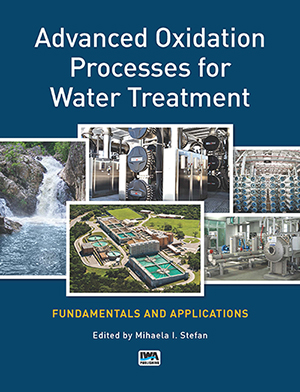 A book review by Dr Francis Hassard, Cranfield University (www.cranfield.ac.uk/people/dr-francis-hassard-227615).
A book review by Dr Francis Hassard, Cranfield University (www.cranfield.ac.uk/people/dr-francis-hassard-227615).
Twitter: twitter.com/Frankiehass
An international panel of University academics and industry experts present a book which highlights processes which can tackle the impending crisis of scarcity of suitable quality water.
The team of chemical engineering academics led by book editor Mihaela Stefan have written a landmark handbook which gives a clear picture of the current state-of-the-art developments in Advanced Oxidation Processes (AOPs) for Water Treatment.
These processes are being widely accepted as one of the most promising processes to improve energy efficacy of water treatment for micropollutants from simple treatment applications to complex reuses schemes within a multiple barrier approach.
The impending crisis posed by water stress and poor sanitation represents one of the greatest human challenges for the 21st century, and AOPs technology has emerged as a serious contender to confront the crisis on a global scale as we move towards a water culture based on direct potable reuse.
The suitability of AOPs for water and wastewater remediation has been shown in research studies. However, to date there are only a few AOPs which have been implemented at water treatment plants at a sensible scale. It is thought that cost and concerns regarding breakdown product formation potential are hampering adoption of these technologies more widely.
The book consists of a series of chapters focused on the various types of advanced oxidation processes. The topic areas discussed within the text, span over common forms of AOPs for water and waste treatment such as ozone and hydrogen peroxide, ozone and UV, hydrogen peroxide and UV processes and AOPs based on Fenton chemistry. This includes the novel technologies, process developments, and case studies. This book then highlights promising ‘novel’ AOPs such as UV and chlorine, plasma, ultrasound wave, gamma ray and electron based AOPs.
The book not only gathers theoretical and fundamental approaches to AOPs but also highlights the full-scale application approaches. A big part of the book is dedicated to optimization of AOPs for industrial waste, including but not limited to textile, pharmaceutical, pesticide, papermill petrochemical and landfill leachate. The book ends with a discussion on using AOPs for modern treatment for drinking water production and advanced treatments for potable reuse. This book would be a positive addition to the book shelf for water professionals, students and university academics.
-------------
Advanced Oxidation Processes for Water Treatment, ISBN 13: 9781780407180, is available now.
Picture 1: Dr Francis Hassard, Cranfield Water Science Institute.
Picture 2: Front cover of book (IWA Publishing).
Picture 3: Hall Water Treatment Works UK.
This review has been reposted from Wet News, the newsletter for IChemE (The Institution of Chemical Engineers)'s Water Special Interest Group. The Water SIG provides a forum for the exchange of ideas and the sharing of experiences in the engineering aspects of water and wastewater treatment.
